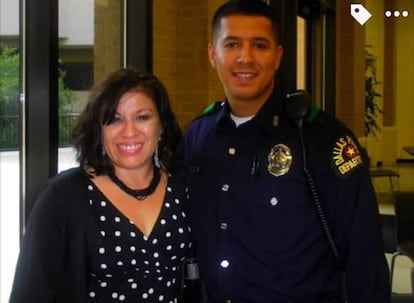Mexican-American police officer among victims of Dallas shooting
Patrick Zamarripa, an Iraqi war veteran, was one of the five fatal victims in the mass shooting in Texas on Thursday


Patrick Zamarripa left the United States navy five years ago because he wanted to be near his family. He swapped the dust storms of Iraq for patrols on the skyscraper-lined streets of Dallas. He wanted to get married, have kids and never miss a Cowboys game. Last week, he made plans to go see his team with his father but, on Thursday night, a bullet bounced off his bulletproof vest and went straight through his chest. Zamarripa was on duty at a Black Lives Matter demonstration when a lone sniper opened fire, shooting 12 police officers, and killing five of them.
“He loved being a marine and then a police officer,” his father, Rick Zamarripa, says over the phone. “He went to war several times. He was very proud. But he had to die here, shot by a madman.” The family, of Mexican origin, has gathered around to offer support to the victim’s wife and two sons. “We don’t want to see anyone,” Rick adds.
He went to war several times. He was very proud. But he had to die here, shot by a madman
Rick had named his 32-year-old son Patricio, but he struggles these days to make himself understood when speaking in Spanish. In Monterrey, the city his grandfather left behind in the 1920s to come work on the railroads on the other side of the border, they would have called him pocho, the term used for Mexicans who have lost their native tongue after speaking English for so long.
Zamarripa, a fourth-generation chicano, did not speak Spanish but he was in touch with his roots. He liked to eat a traditional pork stew for breakfast and he listened to norteña music. “You are not a real Latino until you go to a Michael Salgado concert,” he wrote in a tweet less than a year ago, in reference to the popular Mexican singer.
Patrick’s parents divorced when he was a child, and he went to live with his mother and two siblings. “He was a little shy and a real perfectionist,” his father says, adding that he did not talk about work a lot. Still, they had a good relationship. They shared a love of football and DIY projects. “When he came home, we would often fix a table or the garden,” he explains.
Zamarripa, a fourth-generation chicano, did not speak Spanish but he was in touch with his roots
When he finished high school, Zamarripa spent a few months without knowing exactly what to do next. He asked his family for advice. After speaking to his older sister and a few uncles – all reservists in the army, as so many young Hispanics have chosen to become in the last few years – he chose the navy.
Patrick Zamarripa was one of the 500,000 Latinos living in Dallas, a city that has one of the largest Hispanic communities in the United States. Forty percent of its residents are Latinos and most of them are of Mexican descent. The city even had its own Little Mexico. But now, there is only a little commemorative sign in the park where immigrants and their families used to meet every September 15 to celebrate Independence Day. As the city grew, areas on its outskirts became part of downtown and concrete, glass, and high rents gradually swallowed up Little Mexico.
Sign up for our newsletter
EL PAÍS English Edition has launched a weekly newsletter. Sign up today to receive a selection of our best stories in your inbox every Saturday morning. For full details about how to subscribe, click here.
A group of workers who are laying tile near the park stop to take a break. Three Cubans, a Salvadoran, and a Mexican. José López arrived from Jalisco about 30 years ago but he did not come early enough to enjoy the little Mexican colony. “Now there’s no Mexicans living here, that was before. They don’t want us anymore. Well, they want us to work on the highway, they want us for that,” he says, striking a tone between sarcasm and hyperbole. López and his family live in the suburbs in the south of the city, near that home where the Zamarripas are mourning over the slain Hispanic police officer.
English version by Dyane Jean François.
Tu suscripción se está usando en otro dispositivo
¿Quieres añadir otro usuario a tu suscripción?
Si continúas leyendo en este dispositivo, no se podrá leer en el otro.
FlechaTu suscripción se está usando en otro dispositivo y solo puedes acceder a EL PAÍS desde un dispositivo a la vez.
Si quieres compartir tu cuenta, cambia tu suscripción a la modalidad Premium, así podrás añadir otro usuario. Cada uno accederá con su propia cuenta de email, lo que os permitirá personalizar vuestra experiencia en EL PAÍS.
¿Tienes una suscripción de empresa? Accede aquí para contratar más cuentas.
En el caso de no saber quién está usando tu cuenta, te recomendamos cambiar tu contraseña aquí.
Si decides continuar compartiendo tu cuenta, este mensaje se mostrará en tu dispositivo y en el de la otra persona que está usando tu cuenta de forma indefinida, afectando a tu experiencia de lectura. Puedes consultar aquí los términos y condiciones de la suscripción digital.








































